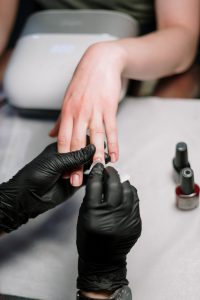Tips for Maintaining Healthy Nails for All

Nails are an important part of our overall appearance and maintaining healthy nails is crucial for both aesthetic and health reasons. However, not all nails are created equal, and different nail types require different levels of care. In this blog post, we will explore tips for maintaining healthy nails for all nail types.
1. Weak and Brittle Nails
If your nails are weak and brittle, it is important to take steps to strengthen them. First and foremost, avoid using harsh chemicals on your nails such as acetone and other harsh nail polish removers. Instead, opt for natural and non-toxic nail polish removers. Secondly, make sure you are getting enough biotin in your diet, which is a vitamin that is essential for healthy nails. You can also take biotin supplements if you are not getting enough from your diet. Lastly, moisturize your nails regularly with a nourishing cuticle oil or cream.
2. Soft and Peeling Nails
If your nails are soft and peeling, it is important to avoid excessive exposure to water and harsh chemicals. When doing household chores or working with water, wear gloves to protect your nails. Also, avoid using your nails as tools, such as using them to open cans or packages. Keeping your nails trimmed and filed can also help prevent peeling. It is also important to make sure you are getting enough protein in your diet, as protein is essential for strong nails.
3. Dry and Brittle Nails
Dry and brittle nails can be caused by a variety of factors, including exposure to harsh chemicals, dehydration, and lack of moisture. To combat dryness and brittleness, make sure to moisturize your nails regularly with a nourishing cuticle oil or cream. Drink plenty of water to stay hydrated, and avoid exposing your nails to harsh chemicals. Also, be sure to use a gentle nail polish remover that is free from acetone and other harsh chemicals.
4. Thick and Discolored Nails
If your nails are thick and discolored, it could be a sign of a fungal infection. It is important to see a doctor or dermatologist for an accurate diagnosis and treatment plan. In the meantime, it is important to keep your nails clean and dry, and avoid wearing artificial nails or nail polish until the infection has cleared up. Also, be sure to disinfect any nail tools or equipment that you use to prevent the spread of the infection.
5. Ridged Nails
If your nails are ridged, it could be a sign of a nutritional deficiency, such as a lack of vitamin A, vitamin C, or protein. To address ridged nails, make sure you are getting enough of these nutrients in your diet. You can also take supplements if necessary. In addition, avoid excessive exposure to water and harsh chemicals, and moisturize your nails regularly with a nourishing cuticle oil or cream.
6. Normal, Healthy Nails
If you are lucky enough to have normal, healthy nails, there are still steps you can take to maintain their health and beauty. First, make sure to keep your nails clean and dry, and avoid using your nails as tools. It is also important to moisturize your nails regularly with a nourishing cuticle oil or cream. Keeping your nails trimmed and filed can also help prevent them from breaking or splitting. Lastly, avoid exposing your nails to harsh chemicals and opt for natural and non-toxic nail polish and nail polish removers.
In Conclusion
Maintaining healthy nails is important for both aesthetic and health reasons. By following the tips above, you can keep your nails looking and feeling their best, no matter what your nail type may be. Remember to avoid harsh chemicals, keep your nails clean and dry, and moisturize regularly. If you have any concerns about the health of your nails, be sure to consult with a

